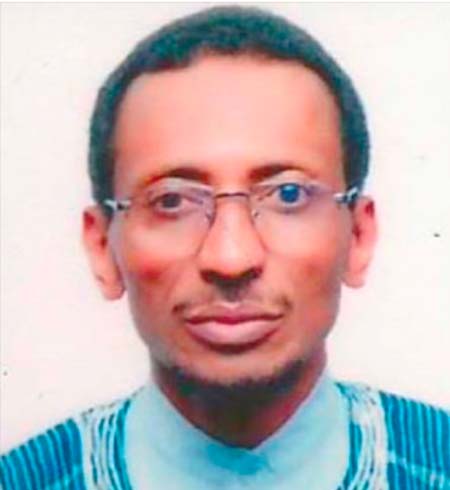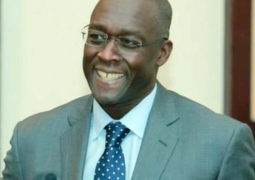
Senior
Counsel A.A.B. Gaye yesterday told the Special Criminal Court presided over by
Justice O. Ottaba that his client, Momodou Sajo Jallow, the former Deputy
Foreign Affairs Minister, was arrested by plainclothes officers since 2
September 2016 and taken to the NIA headquarters in Banjul, where he is still
languishing under NIA custody.
When
the case was called, senior counsel Gaye appeared for the applicant, whilst the
respondent was represented by state counsel S.K. Jobe.
Senior
Counsel Gaye then said the case was adjourned for hearing, but he had not been
served with any affidavit in opposition by the state.
The
state counsel S.K. Jobe said he was told by the lawyer in the case that they
had endeavoured to write to the National Intelligence Agency to find out from
them so they could file an affidavit in opposition, but still they had not
heard from them.
He
said in view of that they were asking for a short adjournment.
He
said they had a copy of the letter sent to the NIA.
Senior
Counsel Gaye then said: “The matter was adjourned for hearing, and I intend to
proceed with the application. The order was made by the court for the state to
file an affidavit and serve the applicant.
“This
is very serious constitutional matter, in which somebody has been detained
incommunicado since 2 September 2016. I am objecting to the application. There
is no reason made known to the court as to why we should not proceed with this
matter.”
The
trial judge then asked him to proceed.
In
moving his application, counsel Gaye said the application dated 28 September
2016 was supported by an affidavit sworn to by one Gibril S.M. Jawo of Farato
with 25 paragraphs.
The
application has one main prayer: which is an order releasing the applicant on
bail unconditionally from NIA headquarters in Banjul.
The
applicant was arrested on 2 September 2016 by plainclothes officers at Manjai
and detained at the NIA.
“Since
his arrest, he has been held incommunicado and denied access to family and has
not been charged or arraigned before a court of law,” counsel Gaye said.
“He
has not been released conditionally or unconditionally, and the reason for his
arrest was not known.
“The
application is brought under section 19 of the constitution. These are very
serious constitutional substantive proceedings that should be complied with.
All the facts in the paragraphs are deemed admitted here. Here, the situation
is more critical because there is no counter affidavit.”
Counsel
Gaye further submitted that paragraphs 5 to 7 are relevant, that the applicant
is “not guilty” of any offence.
“The
applicant has not been charged with any offence in this court or any other
court; the applicant has not been served with any offence relating to his
detention. His detention is irrelevant and unconstitutional. The applicant is
still languishing at the NIA headquarters here in Banjul,” counsel told the
court.
“Your
lordship can assume, without any fear of contradiction, that section 19 of the
constitution was not complied with by the NIA. In the absence of the
applicant’s legal counsel then that section of the constitution is not complied
with,” he added.
“If
you arrest somebody you must tell him the reason why you arrested him, but you
cannot just keep that to yourself. It is quite right, therefore, that none of
the part of section 19 is compiled with by those responsible for detaining the
applicant,” he said.
Counsel
Gaye further said: “In the event that your lordship did not agree with my
submissions on prayer one, I submit that in the alternative, your lordship can
exercise his discretion to acquit the applicant on bail on such terms and
condition the court may deem fit, to enable him answer to any charge brought
against him. There is no charge against the applicant now.”
He
added: “I want to refer your lordship to the facts relevant to the alternative.
The applicant can provide sureties when granted bail. If granted bail, the
applicant shall not interfere with the course of justice should he be charged.
If this court did not grant him bail, the applicant will still languish in
custody. I want your lordship to consider that there are no charges before the
court. Your lordship’s court deals with facts, not speculation.”
Responding
to the application, state counsel S.K. Jobe said non-filing of affidavit in
opposition by the respondent “does not mean that the averments in the affidavit
in support are deemed admitted”.
He
said granting prayer one is at the discretion of the court, and that discretion
must be exercised judicially and judiciously.
He
said judiciary means the laws and in these circumstances the laws cited by
learned senior Gaye.
He
added that they are relying on sections cited by learned senior counsel Gaye.
He
said looking at those sections; it could not be applied to by the court
blatantly without looking at the circumstances and facts before the court.
He
said as per the first prayer, “the evidence adduced by the applicant is so
speculative” that the applicant was arrested by plainclothes members and the
plainclothes people could be anyone, even the watchman on the street.
He
said to apply section 19 of the constitution there must be an evidence of
arrest and detention.
He
said there must be cogent and competent evidence that the applicant is in
detention; otherwise the court could not make any order to that effect.
“It
is our submission that there is no merit in this application, because it is
premised on wrong footing and the laws on which it is based do not apply as per
the application,” he said.
The
case continues on 10 October 2016, at 11a.m.



